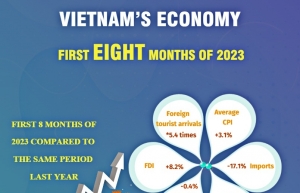The arduous pursuit of economic advances
 |
| Managing partner Oanh Nguyen (left) and trainee solicitor Toby Thieu Dong from Baker McKenzie in Vietnam |
Amid a rapidly evolving global landscape, Vietnam has consistently demonstrated resilience and adaptability. The nation’s economy, characterised by a blend of traditional strengths and modern ambitions, finds itself at a crucial crossroads.
The prognosis for Vietnam’s economy in 2024 suggests a continued period of adjustment for the Vietnamese economy. However, the outlook gradually transitions towards optimism as the year progresses.
The overall economic landscape appears poised for growth, driven by a harmonious interplay of export resilience, sustained foreign direct investment attractiveness, and strategic measures to bolster domestic consumption and public investment.
Vietnam’s economic growth in 2024 is expected to be driven by a combination of export recovery, investments, and domestic consumption. Firstly, exports are projected to remain a cornerstone of the country’s economic expansion. The recovery in export performance is a positive indicator, with sustained momentum. Secondly, noteworthy in this economic landscape is Vietnam’s attractiveness to foreign investors, as highlighted by the significant surge in foreign funding over the past five years.
With a keen focus on sectors such as renewable energy and semiconductors, Vietnam has positioned itself as a promising destination for international capital.
Data from the General Statistics Office of Vietnam underscores the country’s appeal, indicating that foreign investors see Vietnam as a strategic and lucrative market. This influx of overseas funding contributes to economic growth and reflects the confidence of foreign investors in Vietnam’s long-term potential, particularly in industries vital for sustainable development and technological advancement.
This interest from foreign investors also underscores Vietnam’s appeal as a manufacturing hub. Fiscal measures encouraging demand, supported by appropriate monetary policies, are also poised to boost domestic consumption.
The top recent developments that are likely to have the biggest impact on businesses are the introduction of the new legal framework under the newly introduced Law on Land (LoL) and Law on Credit Institutions (LoCI).
Strong regulations
The new legislations in early 2024 also mark a transformative period for Vietnam’s real estate and banking sectors, invigorating with a commitment to transparency, governance, and sustainable development.
In particular, the amended LoL alongside recent legislations on housing and real estate business, solidifies a new legal framework for Vietnam’s real estate sector.
Passed on January 18, this regulatory update brings key changes aimed at enhancing transparency and governance in the real estate industry. Notably, the robust definition of “foreign-invested economic organisation” signals a favourable climate for foreign investors, providing clarity for structuring in project financing exercises.
The introduction of more policies on land pricing reflects a commitment to establishing fair and consistent practices within the sector. Furthermore, limitations on upfront rental payments, focusing on specific cases like industrial parks, tourism, and office buildings, aim to ensure responsible and sustainable development practices.
The amended LoL introduces a series of critical measures to reinforce legal compliance and transparency in real estate operations. The requirement for more public disclosure before any pre-sale activities fosters an environment of openness and accountability.
Additionally, the stringent conditions imposed before pre-sale, land transfer, or project transfer, including settling all land use fees or taxes with the government, add a layer of diligence to the development process. This signifies a regulatory shift, making it more challenging for developers to navigate around the law when raising funds, emphasising the importance of adherence to legal requirements in real estate transactions. The amended LoL represents a significant step towards a more regulated and accountable real estate environment in Vietnam.
Meanwhile, the new LoCI encompasses significant changes. One notable amendment involves the reduction of the maximum shareholding of organisations, decreasing their shareholding from 15 to 10 per cent, and for shareholders and related persons, reducing from 20 to 15 per cent.
The rationale behind this adjustment is to curb shareholder dominance over the credit institution’s operations and affiliated companies within the same group. The potential impact on existing shareholders, especially strategic ones, is significant, as they must navigate solutions to comply with the revised regulations, affecting their investment strategies and internal management influence.
Another pivotal aspect of the new LoCI is the reduction in the limit on credit extension, which has garnered attention due to its potential impact on the operations of commercial banks. The proposal suggests capping the total credit balance of a customer at 10 per cent of the core capital for commercial banks or branches of foreign banks, and 15 per cent or a customer and their related persons (currently 15 per cent and 20 per cent, respectively).
This move may pose challenges for commercial banks, particularly given the low prevailing interest rates. From the borrower’s perspective, especially for businesses navigating new challenges, the reduced credit extension limit could complicate capital sourcing for large projects, leading to more intricate loan structures and higher borrowing costs.
The new LoCI also addresses the burgeoning sector of digital banks, introducing uncertainties and concerns. While the legislation acknowledges the operation of credit institutions through electronic means, it lacks specific guidance on digital banks.
The legislation suggests adherence to the regulations of the State Bank of Vietnam and e-transaction laws for digital banking operations, with the provision of a regulatory sandbox for technological applications in the banking sector. However, the details of the operation of credit institutions via electronic means and the regulatory sandbox remain ambiguous. Clearer guidance is sought to determine whether digital banks fall within this framework and how the regulatory sandbox aligns with ongoing fintech sandbox initiatives in the country. This uncertainty prompts a need for further clarification and refinement in the legislation to foster the growth and regulation of digital banks in Vietnam.
How can businesses best respond?
In response to the amended LoL and related regulations in Vietnam’s real estate sector, investors should adopt a strategic approach to navigate the evolving landscape. Given the emphasis on transparency and legal compliance, foreign investors should closely examine the relevant rights and obligations of “foreign-invested economic organisations” as a land user to leverage the advantages the new LoL provides in project finances.
Embracing the enhanced transparency through public disclosure and diligently adhering to the stringent conditions before pre-sale activities is crucial for investors to foster trust and compliance in the reformed real estate environment. In essence, investors should proactively engage with legal experts to ensure a thorough understanding of the regulatory changes, allowing them to make informed investment decisions aligned with the new legal framework.
Regarding the new LoCI, investors need to carefully strategise their positions, considering the significant changes introduced therein. With reduced maximum shareholding and credit extension limits, investors, especially existing shareholders, must assess the impact on their investment strategies and influence within credit institutions.
Investors in the digital banking sector should closely monitor developments and seek clarity on the regulatory framework. With uncertainties surrounding the application of the regulatory sandbox and the specific operation of digital banks, investors should advocate for clearer guidance and actively engage in discussions to shape the evolving landscape.
 | Vietnam’s economic growth to recover in H2: IMF expert Vietnam can return to high growth rates over the medium term, as structural reforms are implemented, Division Chief of the International Monetary Fund (IMF)’s Fiscal Affairs Department Paulo Medas has said. |
 | Vietnam’s economic performance in the first 8 months of 2023 Vietnam’s average CPI increased by 3.1 per cent in the first eight months of 2023, while foreign investment rose 8.2 per cent and foreign visitors grew 5.4-fold. |
 | Public investment crucial for Vietnam’s economic growth: ADB director Vietnam’s maintaining the momentum of public investment will be crucial because it will rejuvenate economic activities, generate employment, and enhance domestic consumption, said ADB Country Director for Vietnam Shantanu Chakraborty. |
What the stars mean:
★ Poor ★ ★ Promising ★★★ Good ★★★★ Very good ★★★★★ Exceptional
Related Contents
Latest News
More News
- Citi economists project robust Vietnam economic growth in 2026 (February 14, 2026 | 18:00)
- Sustaining high growth must be balanced in stable manner (February 14, 2026 | 09:00)
- From 5G to 6G: how AI is shaping Vietnam’s path to digital leadership (February 13, 2026 | 10:59)
- Cooperation must align with Vietnam’s long-term ambitions (February 13, 2026 | 09:00)
- Need-to-know aspects ahead of AI law (February 13, 2026 | 08:00)
- Legalities to early operations for Vietnam’s IFC (February 11, 2026 | 12:17)
- Foreign-language trademarks gain traction in Vietnam (February 06, 2026 | 09:26)
- Offshore structuring and the Singapore holding route (February 02, 2026 | 10:39)
- Vietnam enters new development era: Russian scholar (January 25, 2026 | 10:08)
- 14th National Party Congress marks new era, expands Vietnam’s global role: Australian scholar (January 25, 2026 | 09:54)

 Tag:
Tag:



















 Mobile Version
Mobile Version